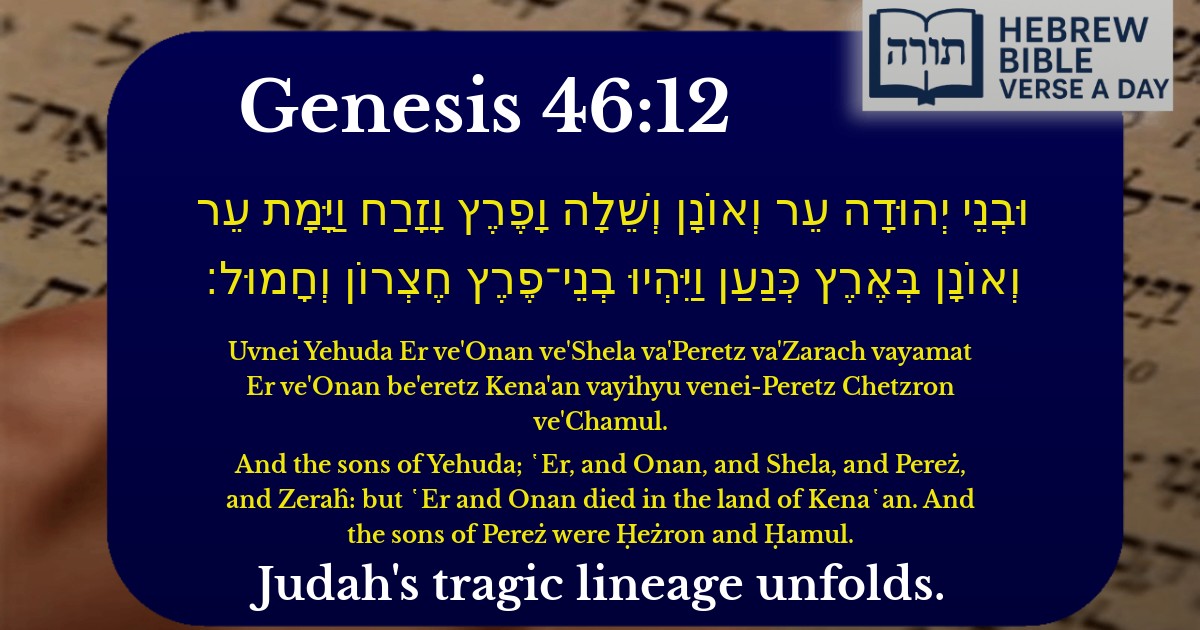Join Our Newsletter To Be Informed When New Videos Are Posted
Join the thousands of fellow Studends who rely on our videos to learn how to read the bible in Hebrew for free!
Hebrew Text
וּבְנֵי יְהוּדָה עֵר וְאוֹנָן וְשֵׁלָה וָפֶרֶץ וָזָרַח וַיָּמָת עֵר וְאוֹנָן בְּאֶרֶץ כְּנַעַן וַיִּהְיוּ בְנֵי־פֶרֶץ חֶצְרוֹן וְחָמוּל׃
English Translation
And the sons of Yehuda; ῾Er, and Onan, and Shela, and Pereż, and Zeraĥ: but ῾Er and Onan died in the land of Kena῾an. And the sons of Pereż were Ḥeżron and Ḥamul.
Transliteration
Uvnei Yehuda Er ve'Onan ve'Shela va'Peretz va'Zarach vayamat Er ve'Onan be'eretz Kena'an vayihyu venei-Peretz Chetzron ve'Chamul.
Hebrew Leining Text
וּבְנֵ֣י יְהוּדָ֗ה עֵ֧ר וְאוֹנָ֛ן וְשֵׁלָ֖ה וָפֶ֣רֶץ וָזָ֑רַח וַיָּ֨מׇת עֵ֤ר וְאוֹנָן֙ בְּאֶ֣רֶץ כְּנַ֔עַן וַיִּהְי֥וּ בְנֵי־פֶ֖רֶץ חֶצְרֹ֥ן וְחָמֽוּל׃
וּבְנֵ֣י יְהוּדָ֗ה עֵ֧ר וְאוֹנָ֛ן וְשֵׁלָ֖ה וָפֶ֣רֶץ וָזָ֑רַח וַיָּ֨מׇת עֵ֤ר וְאוֹנָן֙ בְּאֶ֣רֶץ כְּנַ֔עַן וַיִּהְי֥וּ בְנֵי־פֶ֖רֶץ חֶצְרֹ֥ן וְחָמֽוּל׃
🎵 Listen to leining
Parasha Commentary
📚 Talmud Citations
This verse is quoted in the Talmud.
📖 Yevamot 34b
The verse is referenced in a discussion about the lineage of Judah and the status of his sons, particularly Er and Onan, in the context of levirate marriage laws.
📖 Sotah 10b
The verse is cited in a discussion about the righteousness of Judah and his descendants, focusing on the story of Tamar and the birth of Perez and Zerah.


The Sons of Yehuda
The verse lists the sons of Yehuda: Er, Onan, Shela, Peretz, and Zerach. The Torah notes that Er and Onan died in the land of Canaan, while Peretz's lineage continued through his sons Chetzron and Chamul. This passage appears in Bereishit (Genesis) 46:12, within the context of Yaakov's family descending to Egypt.
Rashi's Explanation on Er and Onan
Rashi (Bereishit 38:7) explains that Er died because he was wicked—his sin being that he prevented Tamar from conceiving to preserve her beauty. Onan, following his brother's death, was obligated to perform yibum (levirate marriage) but instead "spilled his seed" (Bereishit 38:9), an act that was displeasing to Hashem. Thus, both died prematurely as a consequence of their actions.
The Significance of Peretz's Lineage
Peretz, the son of Yehuda and Tamar, is significant because his descendants include King David and ultimately the future Mashiach (see Rut Rabbah 4:12). The mention of Chetzron and Chamul here connects to the genealogical records in Divrei Hayamim (Chronicles), emphasizing the enduring legacy of Yehuda's tribe.
Midrashic Insights
Halachic Implications
The story of Onan establishes the prohibition of hashchatat zera (wasting seed), a principle later codified by the Rambam (Hilchot Issurei Biah 21:18). This underscores the Torah's emphasis on the sanctity of marital relations and procreation.